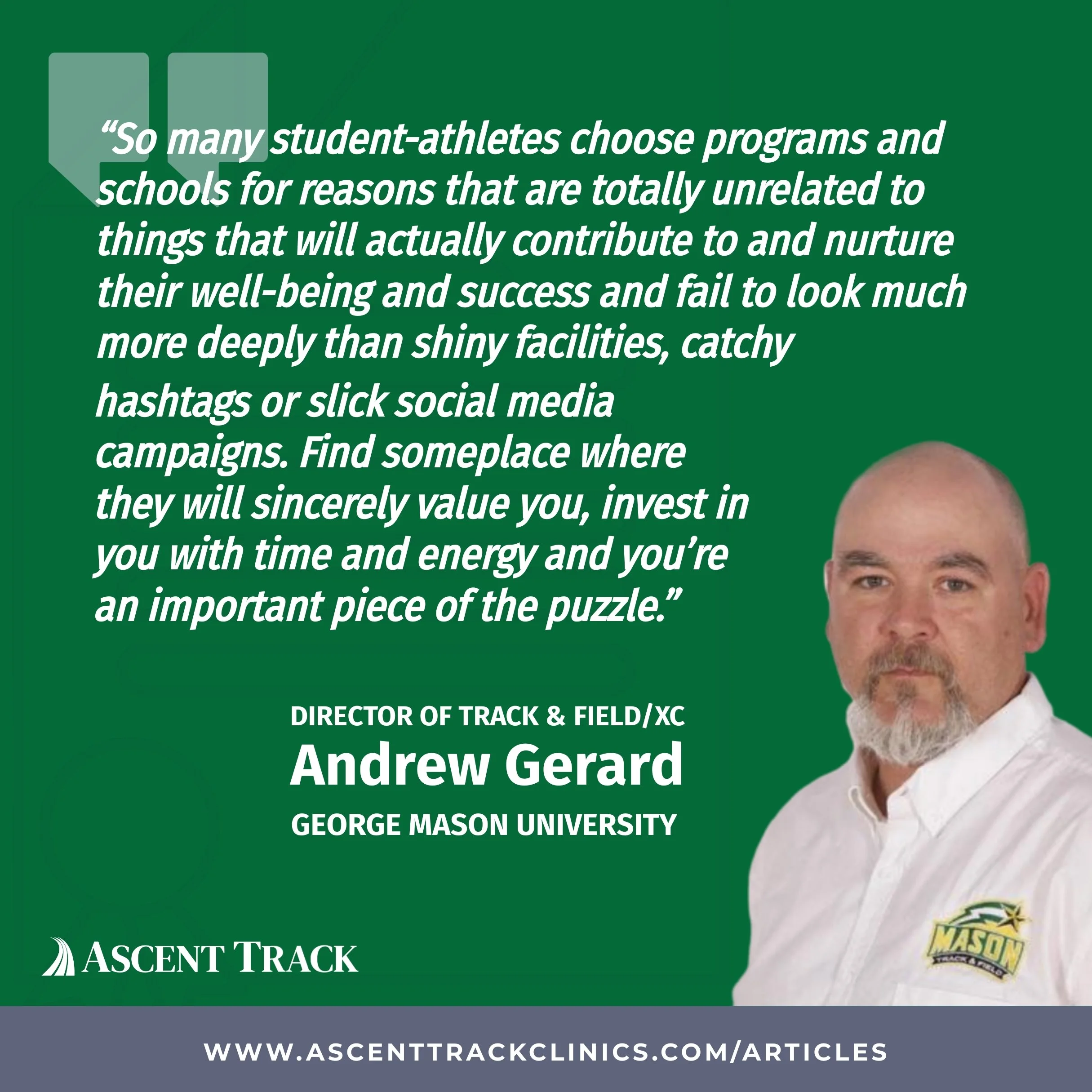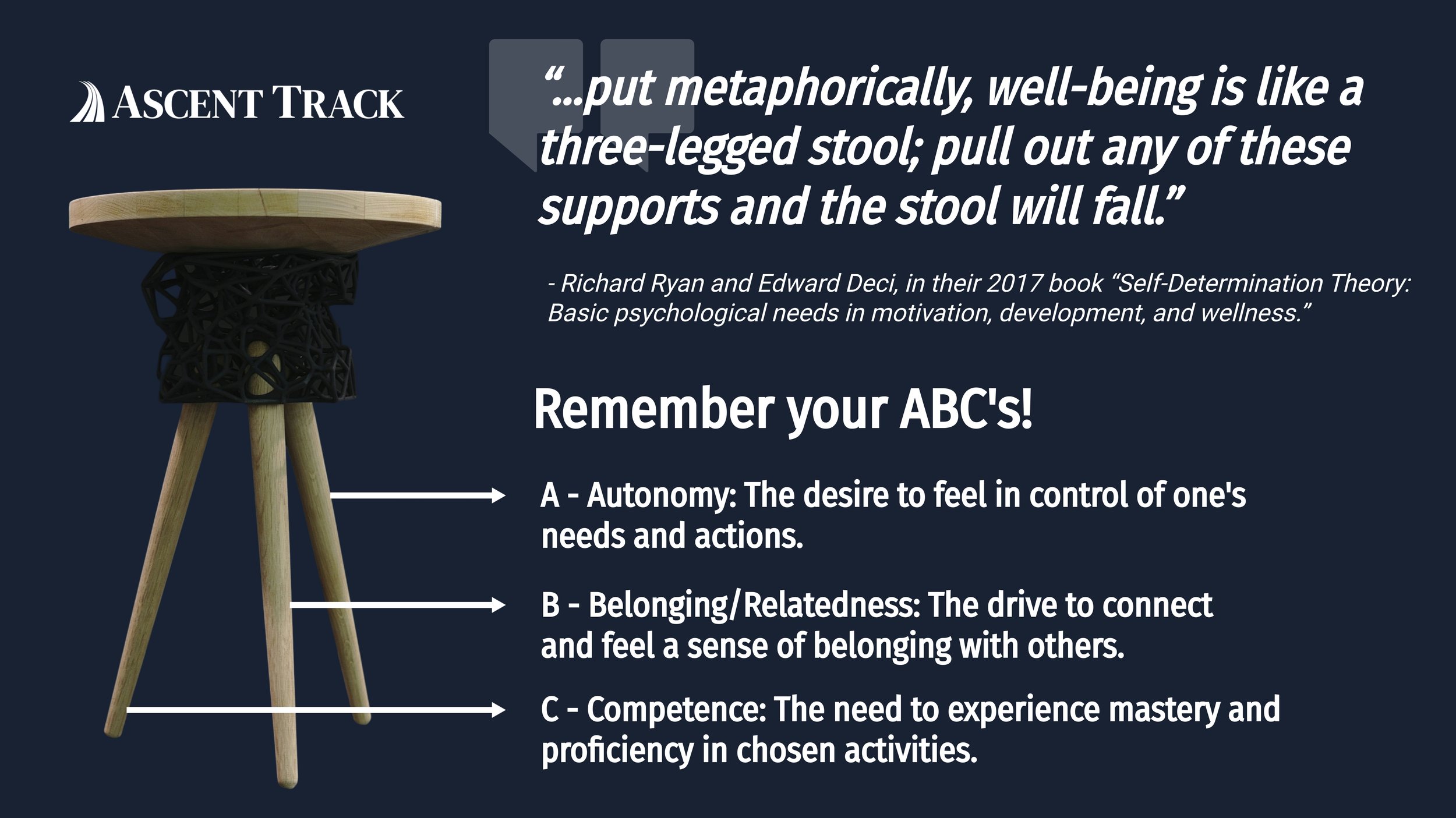How to Use Self-Determination Theory to Choose the Right College as a Student-Athlete
College student-athletes are transferring in record numbers, and according to the NCAA Student-Athlete Well-Being Study, the number one reason is mental health, followed by conflict with a coach or teammate, participation opportunities, academics, financial reasons, and family or personal reasons.
As a high school athlete, how can you avoid going to a school where you find yourself unhappy? How can you weed out the college environments that aren’t a fit for you?
Focus on the right factors
Guidance counselors, coaches, parents, friends, and extended family members will give you a ton of advice:
“But this school is ranked higher according to US News”
“This school is closer to home”’
“They finished top 5 at NCAA’s last year.”
Do those things actually matter? Yes and no.
Is it worth being at a top-ranked academic school if your mental health suffers over four years? Absolutely not.
In 2024, we’re aware of the importance of mental health, but there’s still a massive knowledge gap about what we can do to help ourselves maintain a healthy mental state. For the high school student-athlete, being aware of Self-Determination Theory will greatly help you choose a college.
Edward Deci and Richard Ryan, both psychology professors at the University of Rochester, founded Self-Determination Theory (SDT) after decades of research on what factors into human motivation. Here’s how you can use it to help you choose the right program.
Understanding Self-Determination Theory
According to Self-Determination Theory (SDT), individuals are motivated by three basic psychological needs:
Autonomy: The desire to feel in control of one's actions and decisions.
Belonging/Relatedness: The drive to connect and feel a sense of belonging with others.
Competence: The need to experience mastery and proficiency in chosen activities.
Using SDT to pick the right college
SDT can help you determine the right college for you. Consider each of these factors for the schools you’re visiting.
Autonomy
When you’re evaluating your autonomy at a program, ask these questions:
Why do you want to compete in college? Is it because you love the sport, or is it because you’ve been offered a scholarship, or feel like you’d be disappointing others if you didn’t compete? Hopefully it’s the first reason. If not, you probably shouldn’t be a student-athlete in college.
Will your coach listen to you? You’re not going to be able to dictate the training in a program, but will the coach consider what your personal goals are, and help you get there? Are your individual goals aligned with the team’s goals? Will the coaches be understanding of your academic goals?
Do you have control over your academic and athletic development within the program? Are you encouraged to explore various courses or majors that align with your interests beyond athletics? Does the program offer flexibility in managing your academic and athletic schedules? Does the school offer your academic interests, and how easy is it to pivot if you choose to pursue a different major?
Belonging/Relatedness
The sense of belonging within a college program is vital for your overall satisfaction and performance. Look beyond the athletic aspects and consider the team dynamics, camaraderie among athletes, and the overall campus community.
Do you feel connected with the coaching staff, teammates, and peers? Does the program prioritize a supportive environment for student-athletes? Do the athletes all hang out with each other – and if not, are they outcasts when they don’t?
Do you feel connected with the coaching staff, teammates, and peers? Do you feel like everyone is working toward goals that are aligned with yours? Are teammates supportive of each other, or is there a presence of negativity and toxic inter-team competition?
What does the student body look like? Is it a homogenous or diverse group, and is that a positive or negative for you? You may want a school that has a student body that mostly shares your religious beliefs (or you may not want that at all!)
Do your research by checking out class profiles of incoming freshmen (like this one for Columbia), which should tell you demographic information for that class, such as the percentage of students who are on financial aid, information about domestic racial and ethnic diversity, and academic statistics.Does the program prioritize a supportive environment for student-athletes? What does the athletic program provide in respect to support staff? How many coaches are there on staff (if there are 85 members of the team and only 2 coaches, how much personal attention can there be?)
Where do your priorities – which should be academics and athletics – fall in line with the school's priorities? On campus, can you see that the school takes pride in athletics? If you want to major in a certain field, does the school support that major and will it be able to offer you the opportunities for learning that you will need? Do you get the sense that professors are really going to care about you and help you to get where you want to be?
Competence
We all need to feel competent in what we are doing; maybe not right away, but we need to feel like we are improving and working towards attainable goals.
When we receive positive feedback for something we’ve done, whether it’s a “good job” or a good mark on a school project, we feel more competent, and interest and engagement increase. On the other hand, when people are made to feel incompetent, interest and engagement decrease.
Assessing a college program's ability to foster your competence will be a crucial step to ensure you find yourself in an environment that is conducive to flourishing. Consider the following:
Where do you fit in in the team? Are you going to be the #1 athlete right off the bat? Or are you going to have the 20th-best PR on the team, with little chance of scoring at the team's ultra-competitive conference championship?
You probably want something in-between, where you feel like contributing to the program is a real possibility. It's not fun to be dropped during every training session, and you should consider the academic environment in the same way. Are you going to an academically rigorous college where you’ll struggle to keep up? Or will you have fruitful and engaging classroom conversations with your peers, offering an opportunity to flourish academically over the next several years?Are the athletes improving? A program may look great in meet results, but when you take a closer look at its athletes, have many of them really improved during their time in the program? In some cases, only 1 or 2 of the top-scoring athletes have shown a significant improvement in performance. What is the injury rate? What is the transfer rate? Do your future teammates feel like they’re being encouraged, or (and hopefully this never happens) are they discouraged and insulted every time they don't run a personal best?
Academically, consider the support available to ensure your success both on the field and in the classroom. Every school has a career resource center, and you should make sure to check that out – will they be able to help you pursue internships and prepare you for life after college? What does their alumni network look like? What are the program’s graduates doing in the real world? Will they have you feeling competent and prepared for interviews and employment?
Making an informed decision
SDT can help you make a more holistic and fulfilling choice when selecting a college program as a student-athlete:
Reflect on your needs: Consider what matters most to you in terms of autonomy, competence, and relatedness. Evaluate how each college program aligns with these needs.
Gather information: Research and gather insights by talking to current student-athletes, coaches, and academic advisors. Visit campuses, attend practices, and interact with team members to gauge the program's atmosphere.
Ask questions: During recruiting visits or interviews, ask about the program's approach to supporting athletes' academic and personal development, training methodologies, and the overall team culture.
Learn more at an Ascent Track Clinic
With the help of Deci and Ryan's Self-Determination Theory, you can assess the compatibility of a college program with your needs, goals, and motivations.
Prioritize autonomy, belonging/relatedness, and competence in your decision-making process, and you’re more likely to ensure a fulfilling and rewarding collegiate experience.
Want to hear from real college coaches and athletes about the college experience? Attend an Ascent Track and Field Clinic, where coaches and athletes from 15+ college programs across 3 divisions will not only help you improve on the track, but discuss how to succeed off it – from picking the right school to balancing academics and training. Find our summer clinics on the campuses of Harvard, Columbia, and George Mason this summer.





